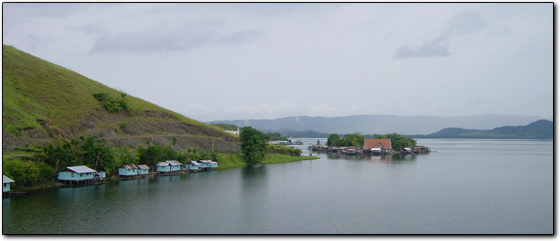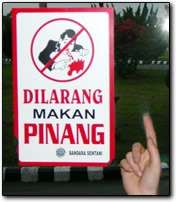
Sentani
Touts were already on the lookout for tourists in Sentani, the air hub for Jayapura. In the airport an undersized Papuan man latched onto us. Smiling sheepishly through his reddish, betel-stained teeth, he offered to help us obtain a travel permit or reserve a flight to Wamena. He followed timidly us as we left the airport, not overtly leading the way, but also not keeping his distance, probably to keep other touts at bay. We finally told him that we didn’t need help, and, with a dejected look, he withdrew. Despite the humid heat, the air was fresh and clear. There was no oppressive traffic or noise. It felt good to look up at the steep, thickly forested slopes of Gunung Ifar, to the summit lost in the swirling clouds.
Jayapura

In Jayapura we went to police headquarters to get our “surat jalan”, or travel permit. It lists the places in Papua that we are allowed to visit. The government wants to keep out journalists and “agitators”, and some areas are closed to tourists, due to the presence of the Indonesian Army and the OPM, or Free Papua Movement, the local guerilla army. Our permit was issued in Eric’s name, with Anne’s name and picture added to the back, as an addendum. In Indonesia, the wife “follows the husband”. In the permit office we ran into a foreigner, Beatrice, who was working on a PhD thesis on shell trading in the highlands. We agreed to meet later in Wamena.
It was soon clear that Papuans were underprivileged people in their homeland. All of the bemo drivers, storeowners, police and government officials were light-skinned “Asian” Indonesians. Native Papuans could be seen sitting on the sidewalks, chewing betel or selling sweet potatoes, tapes or cigarettes. Our hotel was full of businessmen from Papua New Guinea (or “PNG”) who spoke passable English. Dinner was a thick slab of grilled fish and sweet-n-soy peanut sauce accompanied with rice, vegetables and a “salsa” of onions, tomatoes and chilies, cooked by a woman from Sulawesi in a market stall. Asking where we could get some “real Papuan food” only made the Indonesians laugh.
In Papua, people don’t seem as curious about foreigners. Elsewhere in Indonesia, if you are a Westerner, you are constantly bombarded with questions: “Where are you from?” “How old are you?” “First time in Indonesia?”, “Are you married?” “How many kids?” “Why not?” Nobody seemed to care in Papua. Our nearly fluent Indonesian was taken for granted. Either the Papuans are generally reserved, or perhaps they are used to seeing missionaries who speak good Indonesian. In the supermarket in Sentani we spotted jello, instant brownie mix and maple syrup. Who buys this stuff? It didn’t take long to find out: a chubby, blond Middle American came rambling down the aisle. Sentani is so full of ex-pats running church and missionary programs that the town has its own international school.
